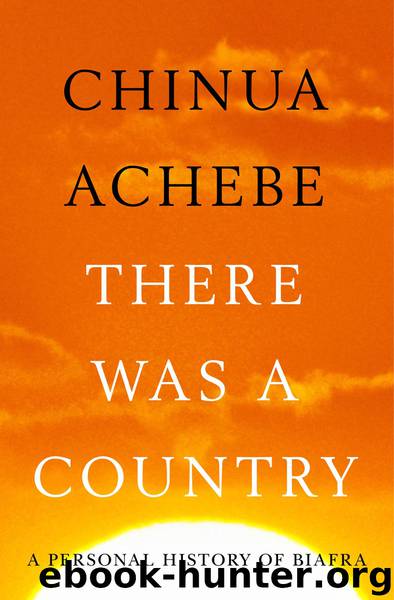There Was a Country: A Personal History of Biafra by Chinua Achebe

Author:Chinua Achebe [Achebe, Chinua]
Language: eng
Format: epub
Tags: General, History, Biography & Autobiography, Personal Memoirs, Africa
ISBN: 9781101595985
Publisher: Penguin
Published: 2012-10-11T00:00:00+00:00
The Abagana Ambush
On March 25, 1968, the Second Division of the Nigerian army finally broke through the Biafran resistance and entered Onitsha. (The federal troops had failed the first attempt to cross the Niger, suffering great casualties at the hands of Achuzia’s guerrilla army; this was the second attempt.) Their plan following this development was to link up these federal troops with the forces of the First Division, led by Colonel Shuwa, that were penetrating the Igbo heartland from the north. The amalgamation of these two forces, the Nigerian army hoped, would then serve as a formidable force that would “smash the Biafrans.”1 Colonel Murtala Muhammed hastily deployed a convoy of ninety-six vehicles and four armored cars to facilitate this plan on March 31, 1968.
Biafran intelligence was swift to respond, and it informed Major Johnathan Uchendu, who formulated an elaborate plan. He arranged a seven-hundred-man-strong counterattack that essentially sealed off the Abagana Road. He commanded his troops to lie in ambush in the forest near Abagana, waiting patiently for the advancing Nigerians and their reinforcements. Major Uchendu’s strategy proved to be highly successful. His troops destroyed Muhammed’s entire convoy within one and a half hours. All told the Nigerians suffered about five hundred casualties. There was minimal loss of life on the Biafran side.
Very few federal soldiers survived this ambush, and those who did were found walking dazed and aimless in the bush. There were widespread reports of atrocities perpetrated by angry Igbo villagers who captured these wandering soldiers. One particularly harrowing report claimed that a mob of villagers cut their capture into pieces. I was an eyewitness to one such angry blood frenzy of retaliation after a particularly tall and lanky soldier—clearly a mercenary from Chad or Mali—wandered into an ambush of young men with machetes. His lifeless body was found mutilated on the roadside in a matter of seconds. “Gifts” of poisoned water–filled calabashes were left in strategic places throughout the deserted villages to “welcome” the thirsty federal troops.
My elder sister’s family took refuge in Nnobi during all this commotion, the town where I was born. My father had settled there as a catechist and a teacher half a century earlier. The hosts of my sister and her family began to tell them that it was from my father that the people of that village learned to eat rice about fifty years before his children returned to this bucolic town as refugees. The host, a man of great consideration and taste, proclaimed that he was, therefore, going to cook rice for my sister’s family to salute my father. There were attempts to humanize our existence despite the horrors that surrounded us all. Life went on as much as the people could manage it.
Through it all, there was a great deal of humor. I remember one occasion after an air raid—and these are really horrible things—somebody saw two vultures flying very high up, and he said, “That is a fighter and a bomber,” and everybody burst into laughter.
Download
This site does not store any files on its server. We only index and link to content provided by other sites. Please contact the content providers to delete copyright contents if any and email us, we'll remove relevant links or contents immediately.
| Africa | Americas |
| Arctic & Antarctica | Asia |
| Australia & Oceania | Europe |
| Middle East | Russia |
| United States | World |
| Ancient Civilizations | Military |
| Historical Study & Educational Resources |
Goodbye Paradise(3798)
Men at Arms by Terry Pratchett(2832)
Tobruk by Peter Fitzsimons(2507)
Borders by unknow(2303)
Arabs by Eugene Rogan(2292)
Pirate Alley by Terry McKnight(2218)
More Than Words (Sweet Lady Kisses) by Helen West(1859)
Belonging by Unknown(1854)
It's Our Turn to Eat by Michela Wrong(1725)
The Biafra Story by Frederick Forsyth(1653)
The Source by James A. Michener(1602)
Botswana--Culture Smart! by Michael Main(1597)
Coffee: From Bean to Barista by Robert W. Thurston(1539)
A Winter in Arabia by Freya Stark(1534)
Gandhi by Ramachandra Guha(1528)
The Falls by Unknown(1520)
Livingstone by Tim Jeal(1482)
The Shield and The Sword by Ernle Bradford(1402)
Africa: Altered States, Ordinary Miracles by Richard Dowden(1381)
